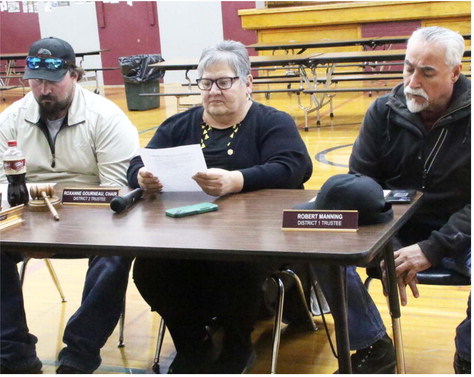Election Clerks Say Referendum Suppresses Votes
Election administrators from three Montana counties told lawmakers Thursday that a voter-passed referendum that limits who can drop off a person’s absentee ballot is frustrating electors, suppressing votes and is easily bypassed.
The Ballot Interference Prevention Act requires election clerks to ask anyone who drops off a ballot if they’re dropping off someone else’s ballot and, if so, they’re asked to sign a form saying whose ballot they’re dropping off and their relationship to them.
People can only turn in six ballots under the law, which supporters in the Legislature said would reduce the chance of voters being bullied into handing over their ballots to strangers who could change them or throw them away. It passed with 63 percent of the vote in the November 2018 general election.
Election administrator Casey Hayes in Gallatin County told the State Administration and Veterans Affairs Interim Committee that one voter became so frustrated last year when he came in to drop off ballots for himself and his wife that he ripped up the ballots and threw them at the clerks.
Clerks reported the destroyed ballot to Bozeman police and contacted the wife to tell her how she could obtain a replacement ballot, Hayes said.
“BIPA creates an unnecessary obstacle to voting, despite the fact that we do not reject ballots due to a lack of BIPA forms,” Hayes said.
“I refer to this as the voter suppression act of 2018,” said Rina Moore, the elections administrator in Cascade County. She said the county can no longer offer 24-hour ballot drop boxes and it makes it more difficult to have a driveup drop box outside the county polling site because people have to be asked whose ballot they’re dropping off and fill out a form if it’s not just theirs.
And, the act doesn’t prevent groups from going doorto- door to collect ballots and offering to turn them in, she said.
“Anybody that is going to go out and harvest ballots can walk right down the sidewalk and dump as many ballots as they want” into the mailbox, Moore said. “The whole intent of the act was to prevent ballot harvesting, to prevent political PACs from collecting ballots and bringing them in or not bringing them in, as the fear mongers would have it be said. But it hasn’t stopped any of that because the Post Office box is still there and they always have the ability to drop it off there.”
Moore also said that a lot of people who bring in their ballots do so because they don’t want their signature going through the mail.
“Now, we’re asking them to fill out a form with their name and address,” she said.
In response to a question, Commissioner of Political Practices Jeff Mangan said someone had already filed a public records request and received the 16,840 BIPA forms collected during 2019 elections.
Republican Rep. Forrest Mandeville said, “It’s fun to throw out words like ‘voter suppression’ to get a rise out of people, but I think we have to keep in mind that this was the first time it’s been used. People will get used to it.”
Experts told lawmakers that 27 states allow ballots to be returned by absentee, a caregiver, or designee, 12 limit how many ballots a person can return, and 13 do not address it. Only Alabama says the voter alone can return an absentee ballot.
Republican Sen. Dee Brown of Hungry Horse suggested the 2021 Legislature could fix the law by exempting spouses and family members from having to fill out the form, but Democratic Rep. Jacob Bachmeier of Havre said he didn’t think that would fix the problem of having to staff drop-box locations to find out if someone should be filling out a form.
Commission chair Rep. Wendy McKamey of Great Falls asked if there was anything the committee could do as clerks face a presidential election year that will likely have a large turnout.
Dana Corson, elections services director in the Secretary of State’s Office, said voter education is the key, with public service announcements from the secretary’s office to local election officials reaching out to local media.
Mangan and Brown said the easiest way around the issue is for voters to put the absentee ballots in the mail. However, voters outside of Great Falls and Billings, where there are U.S. Postal Service processing facilities, could have to mail their ballots five days before the election for them to reach county offices in time, officials said.

